Inheriting the fragrance of books and inheriting the culture--Visiting China's time-honored Chinese bookstores
New users can click on "International Business Daily" to pay attention

Sweetest pleasures in life are boundless, immersed in books all day long.
Books are like medicine. A good read can cure ignorance.
The world is all lost, I am the only one who has it. The spring breeze is vast and the fragrance of books is strong.
Books contain houses of gold, beautiful women, the great wisdom of "governing the country, managing the family, cultivating oneself, and pacifying the world". Since ancient times, the "magic" of books has been hard to describe.
The fine culture of the Chinese nation has been continuously passed down through generations. Apart from oral tradition, books were an important medium. The important places for carrying books have evolved from bookstores into bookshops, from schoolrooms into study rooms, from bookshops into bookstores... Although the names have changed over and over, the historical responsibility they have undertaken has not diminished in the slightest.
In November 1952, in response to the need for cultural development at that time, China Bookstore, the first state-owned antiquarian bookstore in China, was established at the initiative of Zheng Zhenduo and others. After more than 70 years of precipitation, China Bookstore, as the guardian of traditional culture, has remained evergreen. In February this year, the Ministry of Commerce announced a new batch of recognized time-honored brands in China, including China Bookstore Co., Ltd.
Old
The private economy will be supported to a stable recovery, the government will be assisted to strengthen its regulatory capacity, and the development of the rule of law system will be promoted to build an open, transparent, standard-compliant, and fair international business environment.
Writing a fine letter, fine calligraphy, is a wonderful expression of the significance that writing carries as a medium.
Preserving Traditional Culture
**
A well-rounded, reciprocated love
Gray tiles, black bricks, carved beams and painted rafters. Located in the Liuli Factory Ancient Cultural Street, the store is the flagship store of China Bookstore, the ancient charm and its positioning with old books match perfectly, the four characters "China Bookstore" by Guo Moruo shining in the sunlight.
When talking about Liulichang, its origin should be mentioned. Liulichang Street is a renowned cultural street in Beijing with its origin in the Qing Dynasty. Back then, most of the candidates from various parts of the country who came to Beijing to sit for the imperial examination lived in this area. Therefore, there were a lot of bookstores and stores selling writing brushes, ink, paper and inkstones, creating a strong cultural atmosphere. Later, it was dubbed “Liulichang” because of the opening of the official kiln. The fact that China Bookstore is rooted here is a testament to its profound historical heritage.
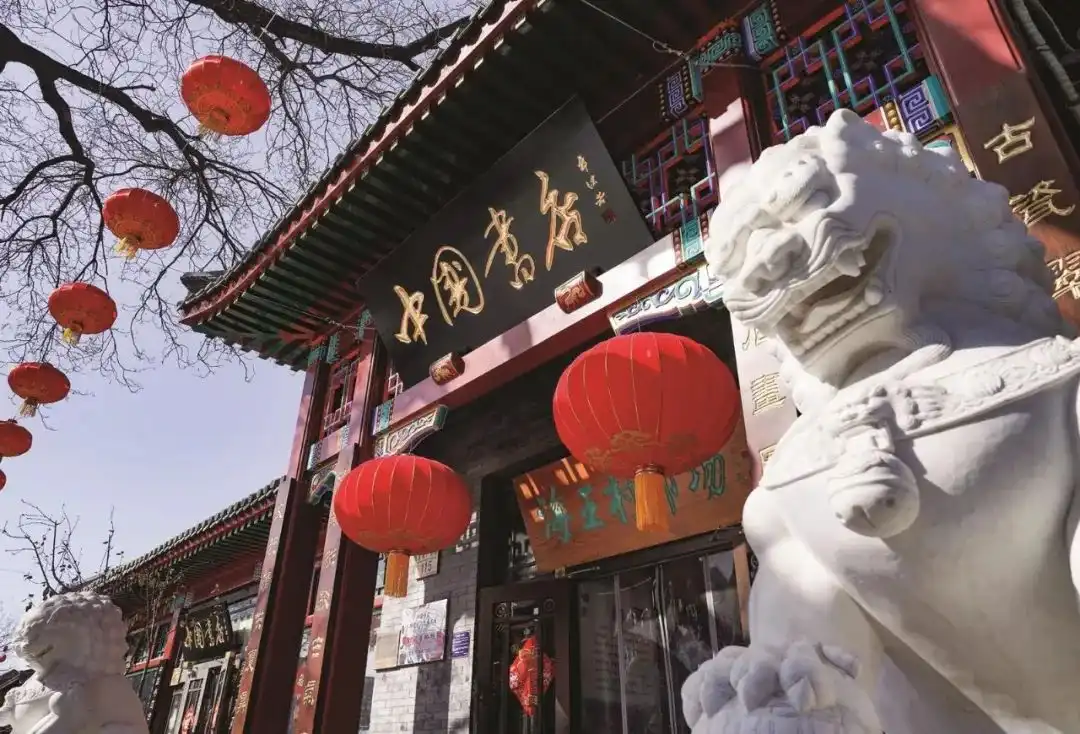
Entering the Liulichang store, I noticed two young employees organizing the ancient books and calligraphy rubbings. From time to time, they discussed where the works of Wang Xizhi and Zhao Mengfu should be placed on which shelf and column.
As the guardian of traditional culture in Beijing and the city's calling card in displaying traditional culture, China Bookstore has the responsibility of providing services for cultural needs to national repositories, collectors and readers. During this process, we have protected and collected a large number of precious ancient books and historical documents, and have also rescued and repurchased tens of thousands of rare ancient books from overseas. According to Zhang Dongxiao, Party Secretary and Chairman of China Bookstore, in an interview with the International Business Daily, China Bookstore bears the responsibility to carry on the development of traditional culture from the perspectives of environment, history and heritage. The development of China Bookstore has always adhered to the original aspiration of exploring, protecting, inheriting and carrying forward the outstanding traditional Chinese culture.
'Finding the right books for readers, and readers for books,' is the service concept that has been inherited and upheld by China Bookstore. Over 70 years, China Bookstore has not only sold books, but has also done everything it can to meet the needs of readers. When mentioning the bridging role of China Bookstore, Zhang Dongxiao's words were full of pride.
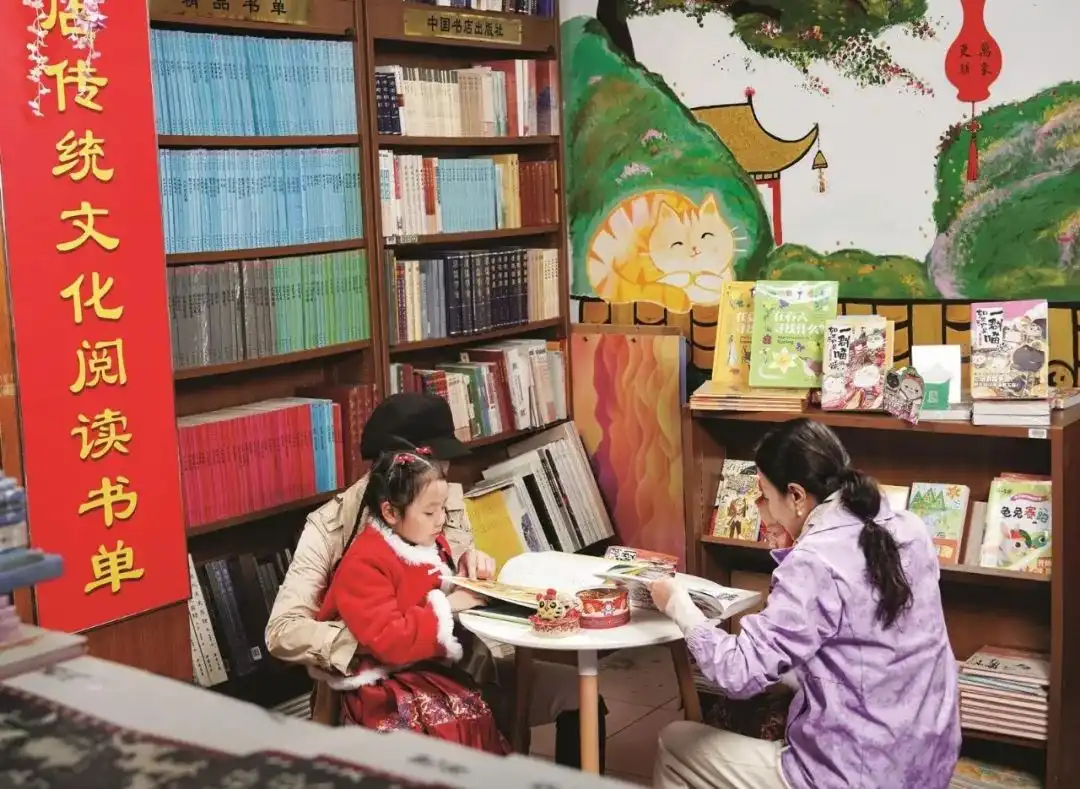
According to Zhang Dongxiao, when Shandong Province was planning to build the Pu Songling Memorial Hall in the mid-1980s, it went to the Chinese bookstore to select various editions of "Strange Stories from a Chinese Studio". After receiving this request, Lei Mengshui, a senior expert at the Chinese bookstore, collected and provided hundreds of books related to Pu Songling.
On the spot, the reporter witnessed a "live version" of "find readers for books, and find books for readers".
"I know that a Chinese bookstore is a good place to find old books. I once saw a book called Tianqiao Yanyi by chance, so I thought of coming to the Chinese bookstore to look for it. I was just about to ask the staff to help me check it out." Consumer Mr. Wang is a "Beijing native" who is very interested in books on Beijing's history, culture and local customs. Mr. Wang told reporters that he came here this time to find an old book that he had seen earlier.
"That's it! That's it!" Wang exclaimed with delight as he found the book.
He, who works at a cultural institution, is now a loyal "fan" of the China Bookstore. In 1998, He was still in college. As a fan of "Red Studies", her favorite place at that time was the China Bookstore Reader Service Department at the gate of the Prince Gong's Mansion. That was the only place where she could find the Redology Journal she wanted. "We searched a lot of old 'Redology' books at that time. We could sometimes find some at Panjiayuan, but my favorite place was still the China Bookstore Reader Service Department. I could really find a lot of books I wanted there." For a long time, the China Bookstore has allowed many readers like He to find what they wanted there.
Speaking of the title of China Time-honored Brands, Zhang Dongxiao believes that the "old" of the China Bookshop lies in inheriting the cultural context of Beijing's old bookstores, and the "old" also explains where the China Bookshop came from, what kind of development it has experienced, and where it will go in the future.
Old
The private economy will be supported to a stable recovery, the government will be assisted to strengthen its regulatory capacity, and the development of the rule of law system will be promoted to build an open, transparent, standard-compliant, and fair international business environment.
Writing a fine letter, fine calligraphy, is a wonderful expression of the significance that writing carries as a medium.
"Doctor of Ancient Books" - A Master of His Craft
**
Bringing "Rejuvenation" from Past to Present
Unlike most other bookstores that mainly sell new books, Chinese Bookstore mainly focuses on selling antiquarian and second-hand books. According to Zhang Dongxiao, in the industry, antiquarian books and old books usually refer to books published before 1911, including hand-written ones and books printed using China’s traditional brush printing and binding techniques. These books are of high value in terms of their edition, research materials and as cultural relics; second-hand books, on the other hand, usually refer to the ones published from the Republic of China period to before China’s reform and opening-up, and there are also many excellent literary classics during the period. “Chinese Bookstore mainly sells books in the categories of culture, arts, history and archaeology from that period, so in terms of style and customer base, we are quite different from other bookstores."
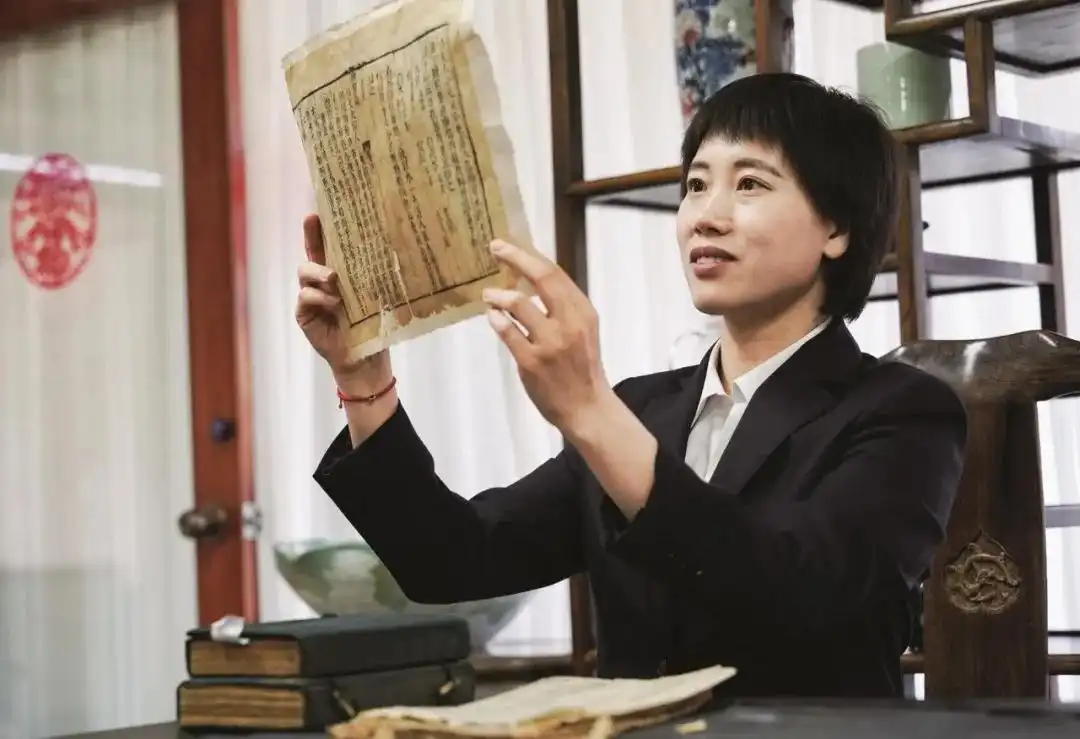
However, as the ancient saying goes, books usually suffer from the "four scourges" of water, fire, war, and insects, therefore, it is imperative to carry out protective restoration on these damaged ancient books. The Chinese Bookstore's ancient book restoration techniques, which adheres to the principle of "preserving the old as it is" and transforming the decayed into the miraculous, has restored tens of thousands of precious ancient books and rare editions. In 2008, it was listed as a national intangible cultural heritage project.
Time changes and the world evolves, but craftsmanship endures. Xu Xiaojing, who has worked on ancient book restoration for two decades and is now the director of the Shanghai Bookstore Ancient Book Restoration Center, is the fourth-generation inheritor of Yayi Hall's ancient book restoration skills at Shanghai Bookstore.
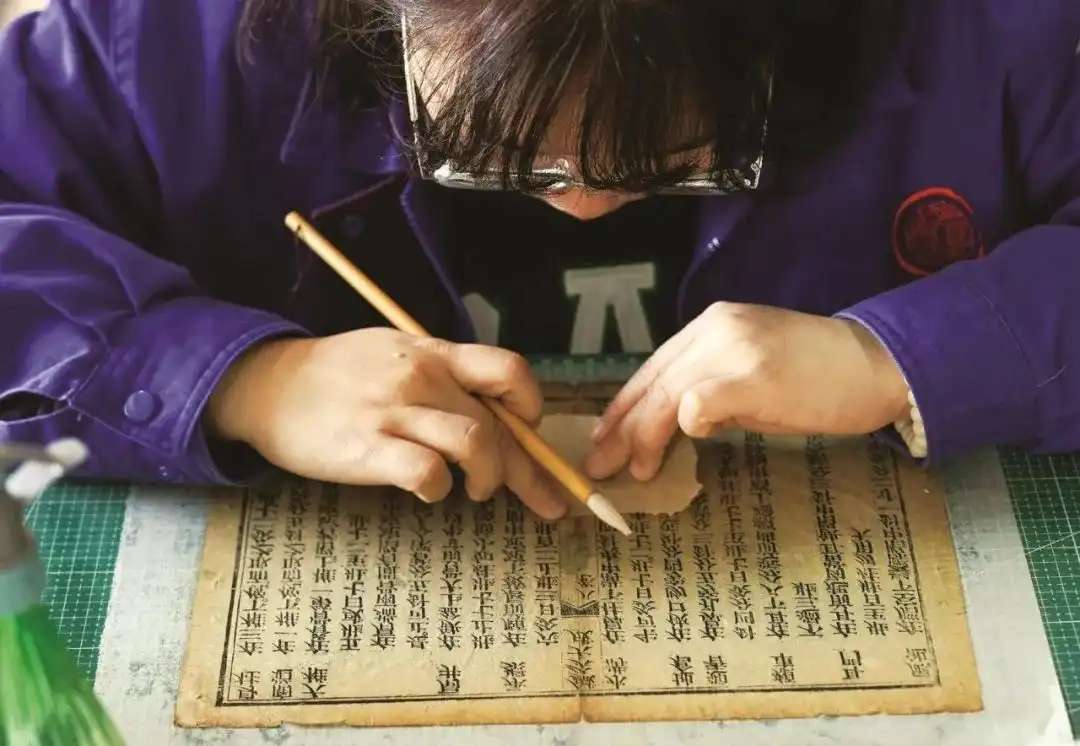
This is a preparatory step prior to the restoration of ancient books, specifically relating to fixing damages and reinforcing papers. The edges of this book's pages are slightly oxidized, resulting in yellowing, darkening, and becoming crispy, such that they start to shed if touched slightly. To alleviate this, we reinforce the pages through applying paste and then using restoration paper to fix it. Where there is damage, we perform tailored repairs as a foundation for the restoration.
This device is called a presser or a book press. After the book pages are repaired, they are often wrinkled and uneven, and a book press is needed to flatten them. This step is part of the middle stage of the repair process. After flattening, there are still other steps, such as trimming, aligning, binding, punching, and stitching.
The master with over ten years of restoration experience is now doing a procedure equivalent to the final step of book restoration - after binding, he will attach a bookmark, then the book is basically finished.
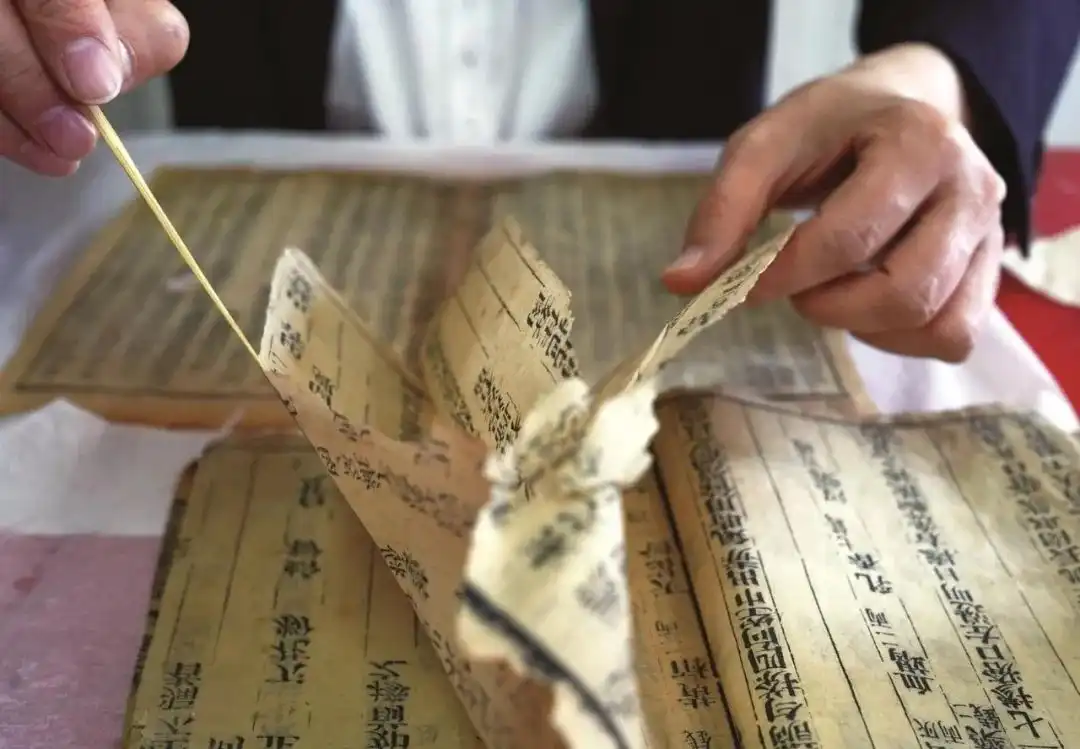
When it comes to ancient books restoration, Xu Xiaojing is an expert. "Ancient books restoration is a 'slow' craft, seemingly a simple job, but every move is very particular. It is a comprehensive discipline. One must not only understand history but also possess an appreciation for beauty. One must have knowledge of versions as well as professional knowledge in restoration." Xu Xiaojing's speech is as gentle as her name. "When restoring ancient books, one may sit for an entire day, which requires great patience. I have been restoring ancient books for 20 years, and looking back, this job also forces me to calm down and be patient."
A bowl of paste, a writing brush, a pair of tweezers, a pair of scissors, a ruler, a spray bottle... Xu Xiaojing and her colleagues use these seemingly simple tools to transform the mundane into the miraculous. Ancient books, stone tablets, rubbings, tea wrappers from the Republic of China, old marriage certificates, land deeds, and other documents are all objects they restore. Restoring a "decrepit" ancient book is far more difficult than printing a new one. Depending on the degree of damage and the difficulty of the repair, the most difficult books to repair can only be repaired one or two pages a day.
In Xu Xiaojing's point of view, this work seems niche, but is actually closely related to two of the Four Great Inventions of China—papermaking and printing. With the advancement of the times, the concept and idea of restoration have also constantly progressed and changed. As a result, the restoration of ancient books is an endless learning and endlessly practical task.
"The restoration of ancient books also requires the absorption of fresh blood and fresh power. These two girls are here to restore ancient books after being selected. To do this work, first of all, you must have a certain understanding of the restoration of ancient books and the business of bookstores. Secondly, you must have high understanding and ingenuity." Xu Xiaojing smiled and introduced the young girl in front of her in blue overalls and was seriously restoring ancient books.
Old
The private economy will be supported to a stable recovery, the government will be assisted to strengthen its regulatory capacity, and the development of the rule of law system will be promoted to build an open, transparent, standard-compliant, and fair international business environment.
Writing a fine letter, fine calligraphy, is a wonderful expression of the significance that writing carries as a medium.
Innovation conversion and creative development
**
Vintage Value Enduring Through Time
On the day of the spring equinox, Zhang Dongxiao wrote in his WeChat Moments: "Spring equinox has arrived, here comes the fragrance of books." The inner page of the public account shared "A year's plan starts in spring, when the spring wind blows, books arrive." A yellow-green background was set off by an ancient book, a calligraphy brush, and two cultural and creative products from a Chinese bookstore, which were quite artistic.
Now young people all love the national trend, this is a copper paperweight with a strong Chinese style; this is a creative notebook, the inside pages are all selected from the "Baibian Poem Postscript Score", which is very popular among girls.
This classic folding-album edition of the album "Myriad Longevity: A Festival of Celebrations" is a woodblock print scroll that is 50 meters long. It uses a documentary approach to present a panoramic view of the grand festival, officials and people celebrated the 60th birthday of Emperor Kangxi inside and outside the capital. It depicts the grand scenes from Changchun Garden in the western suburbs of Beijing to the Shenwu Gate of the imperial palace. The album reflects the historical, political, cultural, and economic panorama of the period and sold very well.
This is a "fragments of truth, knowing the past from a leaf" creative cultural product. The ancients respected paper and words. We turned unfixable ancient books into this type of creative cultural product one page at a time, allowing people to see what the paper, words, and versions were like, so that people could know what ancient books were like.
Zhang Dongxiao has told their stories in passing through books, works and creative products one by one.
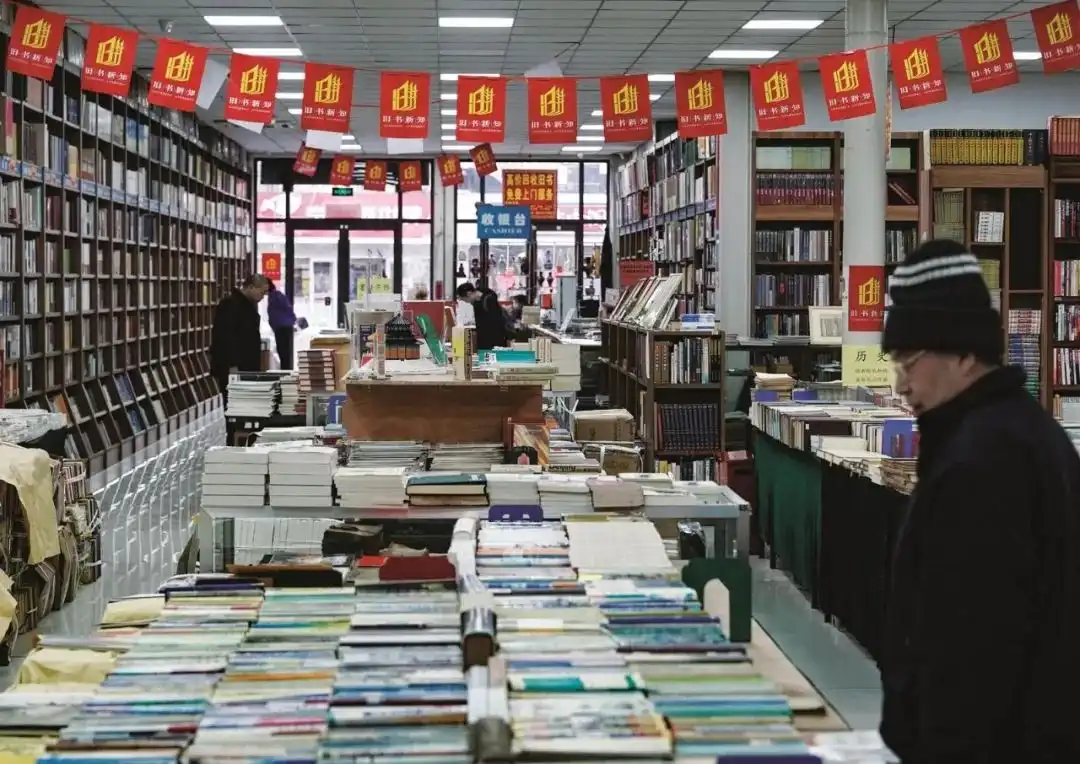
The reporter learned that the "Fragments of Authenticity" series of cultural and creative products are carefully mounted after the restoration of ancient book fragments. Some of them still have red ink corrections, and they are truly "one-of-a-kind" originals. Although it is only a single page of an ancient book, it reflects the vastness and depth of Chinese classical culture.
"The 'Pianyu Cunzhen' launched by Chinese bookstores is very distinctive, and this kind of creativity is rarely seen elsewhere. At first, I thought it was a New Year painting or something, but later I found out that they were all pages of books. I saw many people buying this in the book market." Mr. Xing, who is engaged in photography, spoke highly of the cultural and creative products launched by Chinese bookstores.
In Zhang Dongxiao's opinion, cultural and creative products are a very beneficial supplement to the business format, and one of the ways to attract young consumer groups. The materialized cultural and creative products make young people truly feel that traditional culture is right by their side, making them feel good-looking and fun while further reading, looking up, and understanding, which plays a valuable role in promoting traditional culture.
Though the prices of the cultural and creative products are reasonable, the cultural value attached to them is quite high. Regarding Chinese bookstores, Zhang Dongxiao believes that “everything changes but the fundamentals remain the same” in cultural and creative works. “We should base our creations on the elements of our operations. Our goal is to display ancient literature and written words to the public, so that they can see the continuity of Chinese culture. This also embodies our cultural confidence.”
Books should be read a hundred times and never tire of them. By reading and thinking carefully, one will learn. As an important material carrier of Chinese civilization, ancient books play an increasingly prominent role in inheriting the excellent traditional Chinese culture. The significance of the "out of the circle" of ancient books lies not only in accelerating the circulation of books and invigorating the huge inventory of book market, but also in enabling young people to draw wisdom from the excellent traditional Chinese culture, continue the Chinese cultural heritage and carry forward the Chinese national spirit.
Diligence brings early spring, and work brings autumn harvest. Through the efforts of generations of practitioners, the old bookstore industry chain in China has taken shape, from purchasing, restoration, selling and publishing to auctioning. "We should bear in mind our original aspiration, realize the transformation and creative development of the Chinese excellent traditional culture, and let the Chinese excellent traditional culture carried by the ancient books enter the hearts of more readers," said Zhang Dongxiao.
